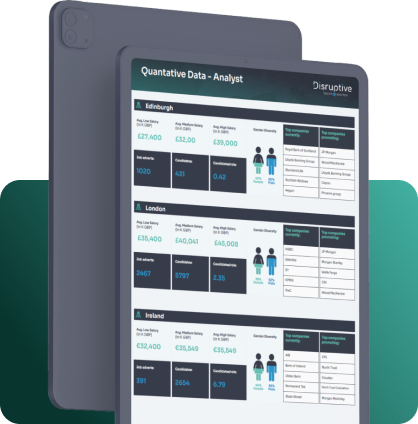Diversity and inclusion is a prominent issue in the tech industry. It’s also one that we’re addressing at Disruptive by promoting higher levels of gender diversity in leadership positions. On Episode 17 of The Disruptive Mindset Podcast I sat down with Ghela Boskovich to discuss how companies should think about inclusion. Ghela is a renowned expert in the FinTech field and currently works as the Head of Europe and Regional Director at the Financial Data and Technology Association, giving her valuable insights into the daily workings of the tech industry. Here are her perspectives on inclusion:
Inclusion is, ‘Do people belong? Do they feel like they are accepted? Do they feel like they are considered from a staffing and a human resource perspective? Do the teams actually have spaces that are accepting and inclusive rather than exclusive? Does the company actively seek out people who are fundamentally different and bring something unique to the team? Is that uniqueness allowed to flourish?’ It’s a wide range of considerations.
Companies need to be willing to say, ‘we’re not going to do what is convenient and easy in the hiring process, we’re going to look at ensuring that we have representation across the board, especially if we serve a diverse clientele’. They have to acknowledge that it’s not just a small segment of the population they serve.
They should also be asking ‘Are we considering our customer base as we start to design? Do our teams that design products, structure products or deliver services also reflect our customer base? Does our customer base feel like we also are concerned about their daily challenges?’ Those daily challenges vary across different populations, attributes and assets – they are not common across the board. Customer bases can change and fluctuate based on attributes, which will affect your market segmentation. Those attributes are also associated with privilege and advantages, yet businesses often don’t recognise that privilege is different for each one of their consumers and colleagues.
Everybody in your talent pool has a different perspective. To not make sure that they are all included in the discussion means limiting your company’s view. You should be actively seeking representation of those disadvantages, those challenges, and those gaps in privilege so that you can understand the client base that you’re serving. To me the most important question is do we actually reflect the community that we serve? And if you don’t make efforts to do that through your recruitment and culture, you’re failing.
An inclusive culture is one that says, ‘you belong, and I recognise you as a human being that deserves dignity and respect as a baseline, and that you have interesting insights that I will never understand because I’ve not walked in your shoes’. If you think about the billions of pairs of shoes that are out there, if we only look at 1% of them, how could we possibly succeed in opening up our own perspectives? How could we possibly connect with our customers or create a product that actually has meaningful impact to them if we don’t include those perspectives and lived experiences? That 1% can only produce something that appeals to a very narrow segment of the population. That is antithetical to doing business, because you want to appeal to as wide a swathe of people as possible.
Just from a philosophical perspective, inclusion is critical. We also know that there’s a business case for it, but I don’t think that’s as important as the philosophical point of view, because business should actually be human centric.
To learn more about inclusion in the tech space, listen to Episode 17 of The Disruptive Mindset Podcast here.


How Disruptive is your Leadership Hiring?
Find out where your management team’s weaknesses are and how you could improve your hiring strategies with this free 5 minute questionnaire.
Contact Us
"*" indicates required fields
